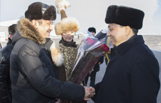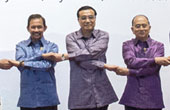China concerned about US Senate torture report
(Xinhua) Updated: 2014-12-10 17:45BEIJING - Chinese media coverage of a much-anticipated report released by the United States Senate, on the Central Intelligence Agency's (CIA) torture of terrorists suspects after the Sept. 11 attacks, gripped the nation on Wednesday.
Ironically, the report, which included a list of the ten major interrogation techniques used by the CIA, was released on the eve of Dec. 10, Human Rights Day -- the day the world honors the United Nations' (UN) Universal Declaration of Human Rights (UDHR).
State television China Central Television (CCTV) covered the story during its early morning program, with its Washington D.C. correspondent, Wang Guan, focusing on the brutality and questionable effect of the brutal interrogation techniques the CIA used on detainees, who it held without trial on the basis that they were suspected members of al-Qaeda.
"[The questioning under torture] didn't result in Osama bin Laden being found, according to the report," said Wang Guan, adding that the CIA had also lied about the number of detainees it had tortured.
It was also revealed that the interrogators would not face criminal charges despite the fact that their behavior violated US laws and the Geneva Convention.
CCTV's 15-minute coverage also exposed that before its release the long-delayed report had undergone editing due to political pressure.
The anchorman called the report "a heavy slap in the face of the American government", which has long portrayed itself to be a defender of human rights.
Although most of Wednesday's morning newspapers missed releasing of the report due to publishing deadlines, the Beijing News, which has a daily circulation of more than 500,000, still managed to dedicate a whole page to the story with a map detailing where and how torture had occurred.
The paper also quoted former US president George W. Bush, who, during an interview with CNN, said that the CIA were "patriots".
The Communist Party of China-run Global Times ran a front-page story on the report on Tuesday, based on foreign media coverage, analyzing the content and possible impact the report would have.
In addition, the Internet has been abuzz with the news, with users of Chinese social media passionately debating the report's content.
Observers attributed the Chinese public's interest in the report to the blatant contradictions between what the US said it did and the actually reality.
Netizens criticized the interrogation techniques used by the CIA, which not only violated the International Human Rights Law but also ran contrary to the values the US claims to uphold.
However, opinion was divided, with some saying that although the way in which the US treated these suspects was wrong, counter-terrorism efforts should continue.
The 6,000-page report, released by the US Senate Intelligence Committee, took five years to produce and is based on more than six million internal CIA documents.
It said that the CIA repeatedly misled the public, Congress and the White House about its aggressive questioning and torture of detainees after the Sept. 11, 2001 terrorist attacks; downplayed the brutality of the interrogation methods; and exaggerated how much the information it gathered had informed their investigation.










